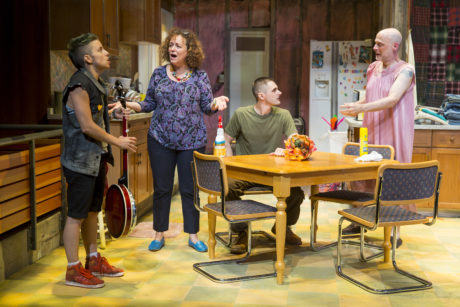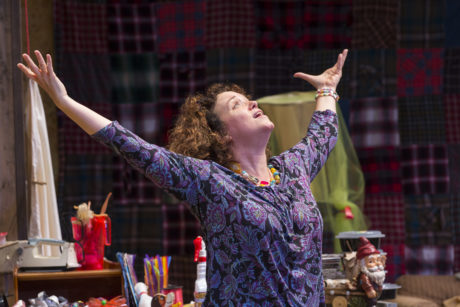The absurdity and grim reality of gender get a scathing going-over in this extraordinary play by Taylor Mac. Inside the hilarity of Hir (pronounced “here”) is a tragedy howling to get out.
Taylor Mac, author of Hir, has a reputation for outrageous originality as a playwright, actor, singer-songwriter, performance artist, director, and producer. I’ve been itching to see this play since Woolly announced it. Everything I heard and read about it made me suspect I would dig it. And I did. Bigly.

After I laughed my guts out at Hir the other night, I figured out why the play had landed for me with so much punch: I recognized in Hir the work of an artist who is a gender abolitionist or gender anarchist—someone for whom bending gender is but a means to ending gender altogether.
It is a trend that’s catching on. For instance, these days it is not uncommon for young people to introduce themselves by saying what their personal pronouns are. The prescriptive presumption that everyone is either a he or a she (and never the twain shall meet) has become today’s flat-eartherism.
Thus the title of Mac’s play is the recently coined personal pronoun hir. In everyday speech hir refers to someone who is non-binary, transgender, or gender-queer, in grammatical constructions where the pronouns him and her would typically track. Here hir is the pronoun of Max, an AFAB (assigned female at birth) 17-year-old who is transitioning and taking testosterone. Known as ze, not he or she, Max is a whip-smart radical queer resister to heteronormativity—and Malic White’s punky, impudent performance in the role is wonderful.
Hir deals with, as Mac has written, “the remnants of the former body politic and the rise of a new progressive body politic.” The trans teen Max is the character from whom we hear the sharpest critique of the old and the most embodied determination about the need for change.
“Ze is becoming an innovator in gender,” exclaims Paige, Max’s cisgender (AFAB) mother. She could be trilling she is so thrilled by Max’s transition. Paige is explaining Max to Isaac, hir 24-year-old, cisgender (AMAB) brother. Isaac has been away for three years in the Marines and is now a war-damaged veteran. He cannot believe what has become of his home and family. The house is a mess. His father is in a dress. He is shocked. “Your sister is not your sister,” says Paige. “Ze has become the new. A revolutionary…. Transgender.” Whereupon Isaac—in a muscularly urgent performance by Joseph J. Parks—rushes to the kitchen sink and pukes.

Paige—a zany, free-spirited true believer in gender revolution—is one of the great new tragicomic roles in contemporary theater. She is the play’s passion and propulsion, and Emily Townley’s nonstop-power performance is not to be missed.
When Isaac arrives he finds his father, Arnold, in a dressing gown in clown makeup and wig. A year ago Arnold had a stroke and is now treated by his wife Paige like a brain-damaged child or an untrained house pet. She squirts him to scold him when he says a bad word or holds his penis. Isaac accuses Paige of humiliating and emasculating his father, and she does not deny it.
Paige’s demeaning of Arnold would read as senseless cruelty but for the back story that emerges about Arnold’s character before his stroke. The portrait Mac paints is revolting: an angry, abusive paterfamilias who beat both siblings and beat and raped his wife. “I joined the Marines so I could learn how to stop him from doing things like that,” says Isaac. The old Arnold is the measure of a man that the new Max, finding hir way between sissy and trans-masculine, never wants to pass as. And Arnold is the reason Paige has become a zealous convert to the cause of overthrowing “the male-dominated hegemonic paradigm.”
The previous Arnold is never literally onstage. The powerless and pathetic Arnold we see (in Mitch Hébert’s eloquent performance) bears no resemblance. But that pre-stroke patriarch drives the action of the play like a primal scream: The character stands in for all that Paige recoils from, all that she wants to avenge, and all that she wants to dismember about gender.
The fact that the ways Paige picks to do so are quite unhinged makes for a cascade of comedy. But what motivates Paige to do so is the show’s caustic undertone.
The argument Paige makes—in a sincere but fractured and scatter-brained way—is that the gender binary has got to go. The alternative would be to accept patriarchal power relations as a natural imperative, biologically inevitable.
Hir by Taylor Mac, now playing in a fast-paced production at Woolly Mammoth Theatre Company directed by Shana Cooper, is a seditious celebration of the beyond-gender trend. And it’s one of the funniest and profoundest farces I’ve ever seen.
Running Time: Two hours, with one intermission.
Hir plays through June 18, 2017, at Woolly Mammoth Theatre Company – 641 D Street NW, in Washington, DC. For tickets, call (202) 393-3939, or purchase them online.





